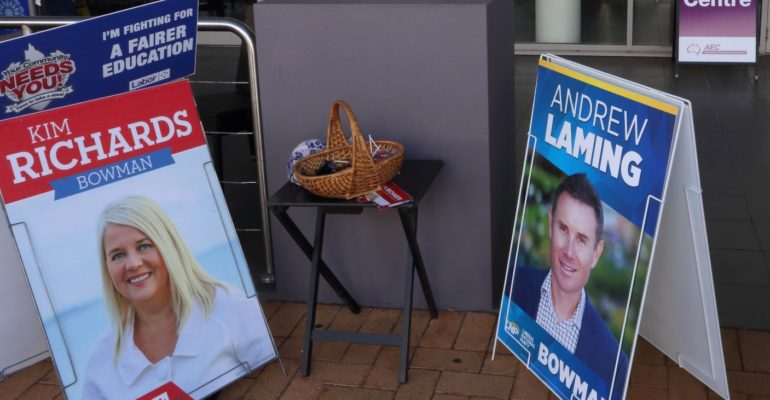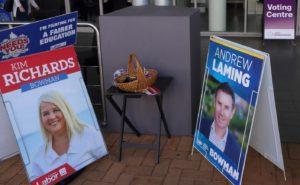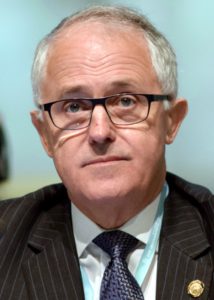

Federal election 2016
Australian democracy has delivered two tight results in the last few years raising questions about our major political parties.
In 2010 we had a hung parliament for the first time in 70 years following the Rudd Gillard Revolving Door Wars. After the Abbott/Turnbull spill in 2015 the 2016 election is still up in the air after a week of vote counting.
The average Australian’s trust in politicians is at a 20-year low and voters are currently nervous about the world economy since Brexit and with an unconventional US Presidential election ahead of us.
The major parties are declining in their membership base. Voters have little reason to trust many of their politicians giving way to a rise in support for minor parties and protest votes.
Party problems

Malcolm Turnbull
Labor is faced with its complex relationship with the unions. The Liberals’ ties with big business raise questions and the Nationals struggle for relevance as the traditional party of rural interests.
The power players of the major parties struggle to adapt to changing modern times delivering spin for the 24/7 media cycle but not understanding the average voter’s policy interests. This begs the question, who really controls our party system and is it time to reform the major parties?
Malcolm Turnbull seems to have underestimated popular dissatisfaction with major parties. His reforms to the Senate voting system last year triggered the rise of the centrist Nick Xenophon Team, the resurgence of the populist controversial One Nation party and support for various other minor parties in the Senate delivering anything but stability for the parliament.
“Crash through or crash”

Gough Whitlam Prime Minister 1972-1975 Photo: Museum of Australian Democracy
Former Prime Minister Gough Whitlam once said that reform is hard “you either crash through or crash”. What is certain however is the move away from the major parties which begs the question is it time to accept party reform and allow shared balance of parties in the parliament, rather than a duopoly in power with a born to rule mentality?
Labor has always been the working man’s party, the party of social progress, innovation, and nation building. Labor has often governed in crisis times think back to Fisher in World War One, Scullin in the Depression, Curtin and Chifley in World War Two and the post war era afterwards, Whitlam during the 1970’s oil crisis days, Hawke/Keating during times of turbulent economic reformation and Rudd and Gillard during the GFC. People seem to have trusted Australian Labor the most to get through the tough times.
Labor has also provided us with big policy initiatives like Medicare, workers compensation, superannuation, national environmental protection and native title for our first Australians.
In all its 120 years of existence Labor has proven its worth as a political movement and become entrenched in the establishment.
Coalition achievements

Sir Robert Menzies Prime Minister 1939-41 and1949-66
The Liberal – National Coalition has been the party of the middle class – successful business orientated Australians. Remember Menzies’ “The Forgotten People” speech at the height of the second world war.
The Liberal Coalition has also been championed as the party in economic easy times with the exception of the Fraser era.
High employment, technological advancement, post war reconstruction, Aboriginal/Torres Strait enfranchisement, the Colombo Plan were major trademarks of the Menzies era. Establishing the Human Rights Commission and SBS, and introduction of Native Title rights in the NT were trademark achievements of the Fraser era. Strict gun laws, response to the Bali bombings and introducing the GST were achievements of the Howard era.
The major parties need reform

Bill Shorten
Despite these policy successes of the previous century both Labor and the Coalition have struggled in the 21st century. What does a 21st century major party duopoly represent? The trade union movement is in gradual decline, party membership is not what it once was decades ago and party policy is hard to come by in the Labor machine. People may call for a change of leader yet the issue of Labor’s problems go beyond the federal leader. Shorten’s Labor made some gains at the 2016 Federal Election against Turnbull but Labor still needs reform.
As for the Coalition, it is a movement beholden to business interest and industry lobbyists. In an era of the Panama leaks and many starting to call for a royal commission into the banking system in Australia little wonder why many are leaving in troves to join One Nation, NXT, and the Australian Liberty Alliance in the Liberal movement. Labor unlike the Coalition has made small grounds in way of reforming its structure.
When analysing the recent election take Labor for example Shorten’s policy focus was a superb vote attraction promising action on negative gearing, Medicare, NBN, Equal Marriage and childcare policies. Labor does however lack a policy infrastructure outside its National, and state conference base and still adheres to the old style of spin and policy reliance on advisors. This has worked for Labor before but it can be argued that Labor has done best in recent times of government when reaching out to external avenues; look at the NDIS – this initiative came from Rudd’s 2020 summit. The NBN was advocated by experts from the field. Lack of policy creativity and expertise has reduced credibility of the major parties in recent years.
Party democracy
Another question both parties face is party democratization. Ordinary voters are sick of the major parties revolving their leaders both in Government and Opposition without a say, especially in Labor where the vote has entrenched the power of machine men of the trade union movement.
Unions are not the problem – our lives are easier because of them. It is the career driven behaviour associated with people looking for a sweet ride into public life that corrupt the system without any real upskilling, training, or mentoring. People want their politicians experienced in the real world like them, seeing things from their point of view.
If the union base and Labor party are to grow and survive they must find ways of modernizing by not being afraid to invest time in external sources, building bridges with businesses and expanding peoples say in both the party and public in their processes when selecting the leaders, and local, state, and federal candidates. The case for Labor is to develop a whole cultural change within its ranks. The same must happen to the Coalition with regards to its own structural apparatus.
Stop the gravy train
The Abbott/Turnbull government royal commissions found levels of corruption in the union movement but much of it was trivialized in the media cycle. Much has also been said about the Panama leaks recently and the banking sector’s need for corruption watchdogs and investigations. If anything, all of this highlights the need for a federal corruption watchdog. Shorten’s move to consider a National ICAC proposal in line with the Greens was a no brainer, but this is only the start. A lack of transparency only raises voters’ suspicions. People are sick of the gravy train.
Give party members more say
With a more educated base in the party structures that looks to avenues outside its current party infrastructures with more direct say and contribution from active enriched party membership the parties can develop stronger policy. Trade unions must survive but in doing so working in par on a local level can ensure more grassroots engagement with the community and local ALP base. The same can be said for corporate and small business interest in both the Labor and especially the Coalition base. The major parties should look at educating their base through education bodies, elders mentoring and or seminars on how to be politically active and mentor in ways of leadership and respect, ethics should be above all else in ways on how best to serve the people.
A code of conduct should be explored in all political parties – major and minor. Factional interests must be downplayed especially for candidate selection at local, state, and federal levels. If the major party rank and file members are given a say on selection of order on party tickets (for example Senate candidates) and more say on who their candidates are come election time (either local candidates or party leaders) with less interference from executive based interests in the major parties, there will be more stability, more direction, less reason for voter disillusionment with the parties.
The major parties regardless will have to work through the heat of a contentious hung parliament through the art of negotiation and diplomacy with the minor parties but by doing so they must look within as well to modernize to create an incentive for people not to flock away from them either.
Perhaps Australia is moving away from the two major party system to a multi-party one similar to New Zealand and Canada. If this is the case the faceless men and women of the major parties must forsake their power interest for the greater good of their movements in order to survive. Nobody in any party whether it be Labor, Liberal, Greens, NXT, or One Nation etc. is born to rule, leadership comes from listening and acting upon everybody’s interests no matter where they come from in society, young or old, black or white, man or woman, gay or straight. We are all Australians and we all deserve a voice in what makes Australia great, a say. No matter which side is in government shortly this is the mood of the populace and it must be respected and acted upon.
People want action in their government.
Callen Sorensen – Karklis

Callen Sorensen-Karkliss
Callen is an active member of the Australian Fabians Society, ALP, Crime Stoppers, Meals on Wheels and is a Quandamooka Noonucle Indigenous person with a strong commitment to community. Callen has worked in the retail and market research sectors and is currently a student at Griffith University.
Published by Redlands2030 – 10 July 2016
Please note: Offensive or off-topic comments will be deleted. If offended by any published comment please email thereporter@redlands2030.net
Being totally objective the problem is that the party system is fatally flawed.
One only need to consider Organizational Theory ( as in scientific meaning of theory …read law)
The first objective of any ongoing organization is always it’s own survival/longevity to the exclusion of everything and everybody else. See ( how many times have you come across ” for the good of the party/business/ company?”)Philosophically and objectively I have deep problems with that notion. ( e.g. who says ? who says that the interests of the party are objectively better or actually destructive to the …well… All of the voters.
After all 40%+ didn’t vote for our current um representative. In reality The Liberal party (specifically) didn’t get the most 1st Votes, Labor did.
I’d argue that a.who and why chose Lamming and someone ( more Appropriate/ qualified?) as the candidate Answer it wasn’t the majority of Redlanders. It was clearly on emotional reasons and and perceived by the power leaders in the branch ( who have their own agendas) see lobbying it has nothing to do with competence or appropriateness by all the members and forget the majority of Redlanders. And they must be sanctioned by Head office ( who have their own agendas power etc).
Who says that the candidate actually is best as Representing ALL The electors.
Added to that Who amongst the electors actually know or understand ALL the party’s policies.
Ergo Mandate(?) to do what ( all … really?). And who says that all reflect the majority of voters
Simply look at Marriage equality? If it went to a simple vote it’d be carried regardless of the party( ies)
The Green policy platform suffers the same channelling but in a slightly different way. Some of the Greens polices are similar in effect as the Liberal’s i.e. An act of supreme Faith… how are we going to pay for All their polices especially give they are never green fields there are always other factors, existing contracts etc.
So in my mind party reform is not the only or even major option.
There are others that have shown work but then we have human and their personal agendas to manage.
Anybody interested? I doubt it.
The Greens are proud to be a party that is committed to grassroots, participatory democracy, with members being the primary decision-makers on policy, pre-selections and preferences. And we have worked hard to maintain this position, with a two-year member-driven national constitutional review being concluded at the end of 2014.
Hmm. I wonder if you’re simply replacing one prejudice with another.
I could wax lyrical about the flaws in the The Greens, their platform, the way they disappear after elections untill the next one and then wonder why they don’t do better.
I actually attempted to got along to the local branch to decide if I should join. What I encountered was what I call the ” fired up mum’s syndrome” i.e. we have our little clique and we’re doing fine. We only need more soldiers ( read hand out how to vote cards etc).
From where I sit the branch could benefit from some more professional real political/ marketing skills/ experience.
And before you jump to conclusions I didn’t want to take over and it has nothing to do with gender it is about logical and factually well founded planning, organization etc. In short the greens campaign suffered from part time amateurism especially compared to the LNP campaign to continue the employment of what has to be the most ineffectual local member who holds the position. Frankly I wouldn’t hire a PR or lobbyist with his record. It’s woeful. He is there only because no one has put up a viable alternative with a better campaign.
This is something that has confused me for some time. For the good of the party is a problem when the party’s interests do not coincide with those of the community. If the party pursues its interest to the detriment or exclusion of those of the community, it may win in the short-term but in the longer term it will lose. People will realise that the party does not have their interests at heart and so not support them. This will not happen all at once, but as more and more people come to the realisation that the party supports its interests above those of the community, it is game over. The speed with which this will happen will depend on what are the alternatives available.
Dissatisfaction with the two major parties is on the increase, this is evidenced the results in the recent Federal Election. The number of independents has increased especially in the Senate which more accurately reflects where people’s choices are than the voting for the House of Representatives does. What was interesting was the increase in the primary vote for the Greens in some electorates,e,g, Batman and Port of Melbourne. In Batman, the Greens candidate attracted the largest primary vote, and ALP won the seat on LNP preferences (?). In Port of Melbourne the Greens attracted 3% fewer primary votes than the ALP candidate, so they are threatening the ALP there.
The Greens are the only “major” party that understands the relationship between the health of the environment and the health of the economy. That places them in the better position to transform the Australian economy to sustainable use of the environment especially since they can see the economic benefits of doing so, e.g, switching to renewable energy. The LNP and ALP either cannot see this or they are beholding to big business or large trade unions which want to keep business-as-usual.
The problem that I see with the Greens is that they are perceived by many as a one issue party – environment. The challenge for the Greens is to get people to read their policies since they get very little positive publicity from the media, especially the Murdoch Press. If one reads their policies they are anything but a one issue party. The Greens are a reformist party and the community is not ready for it. Meanwhile, the Greens are developing their political skills and know-how and will challenge both LNP and ALP in the House of Representatives.
I do like your insights as to what is wrong with the GReens and maybe the local branch clique and Federal organisation are ready to listen to this sort of constructive criticism.